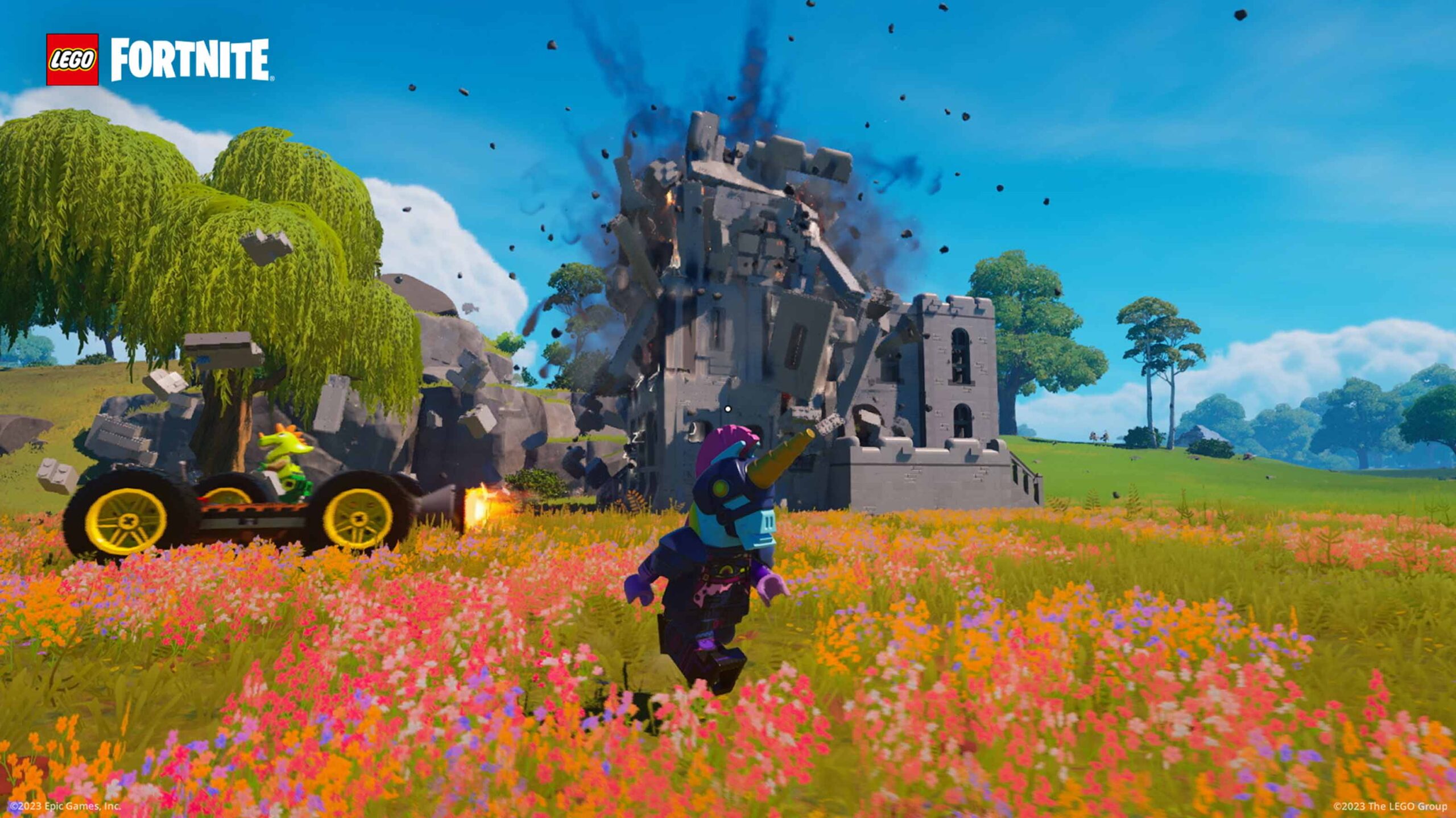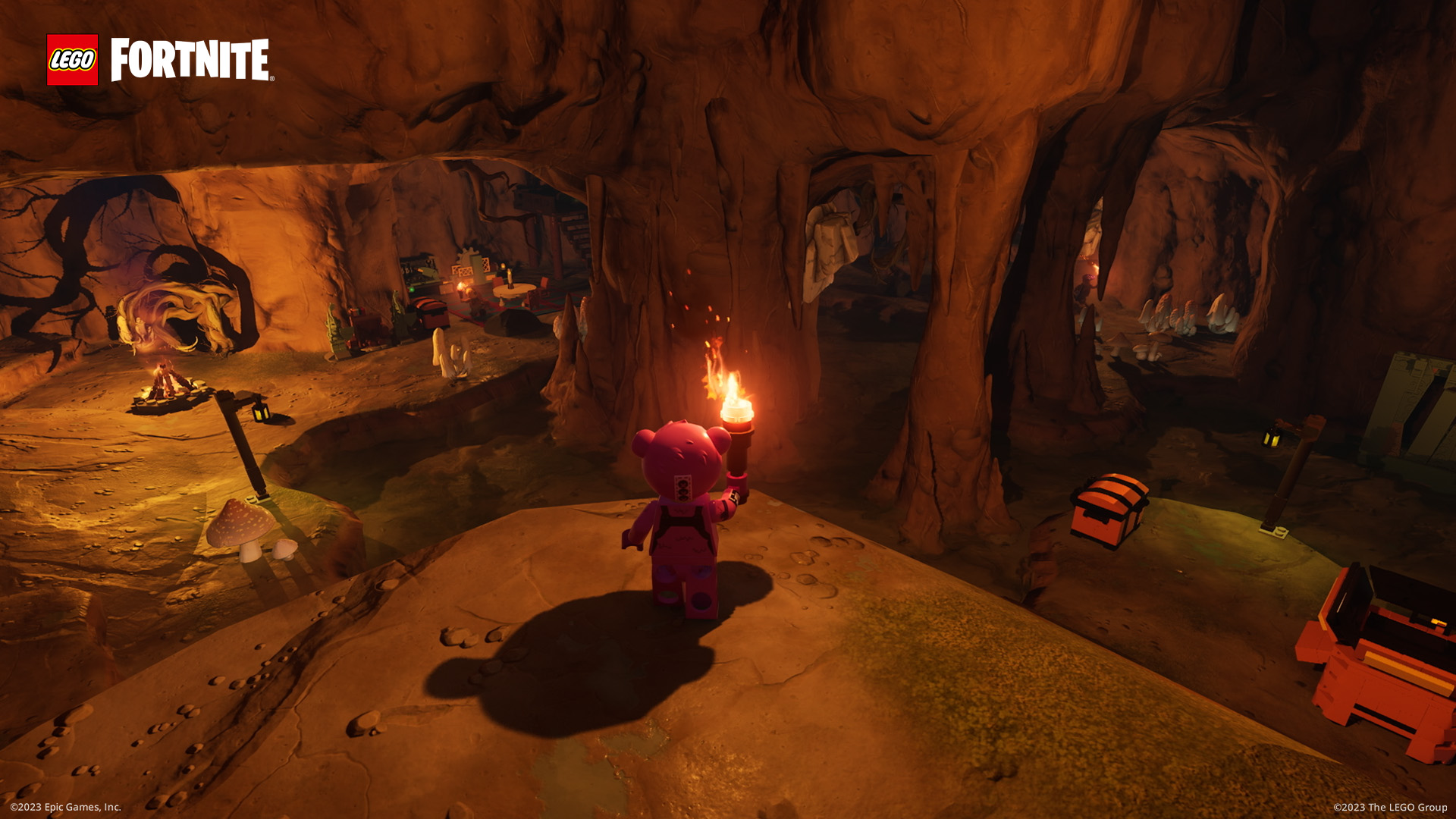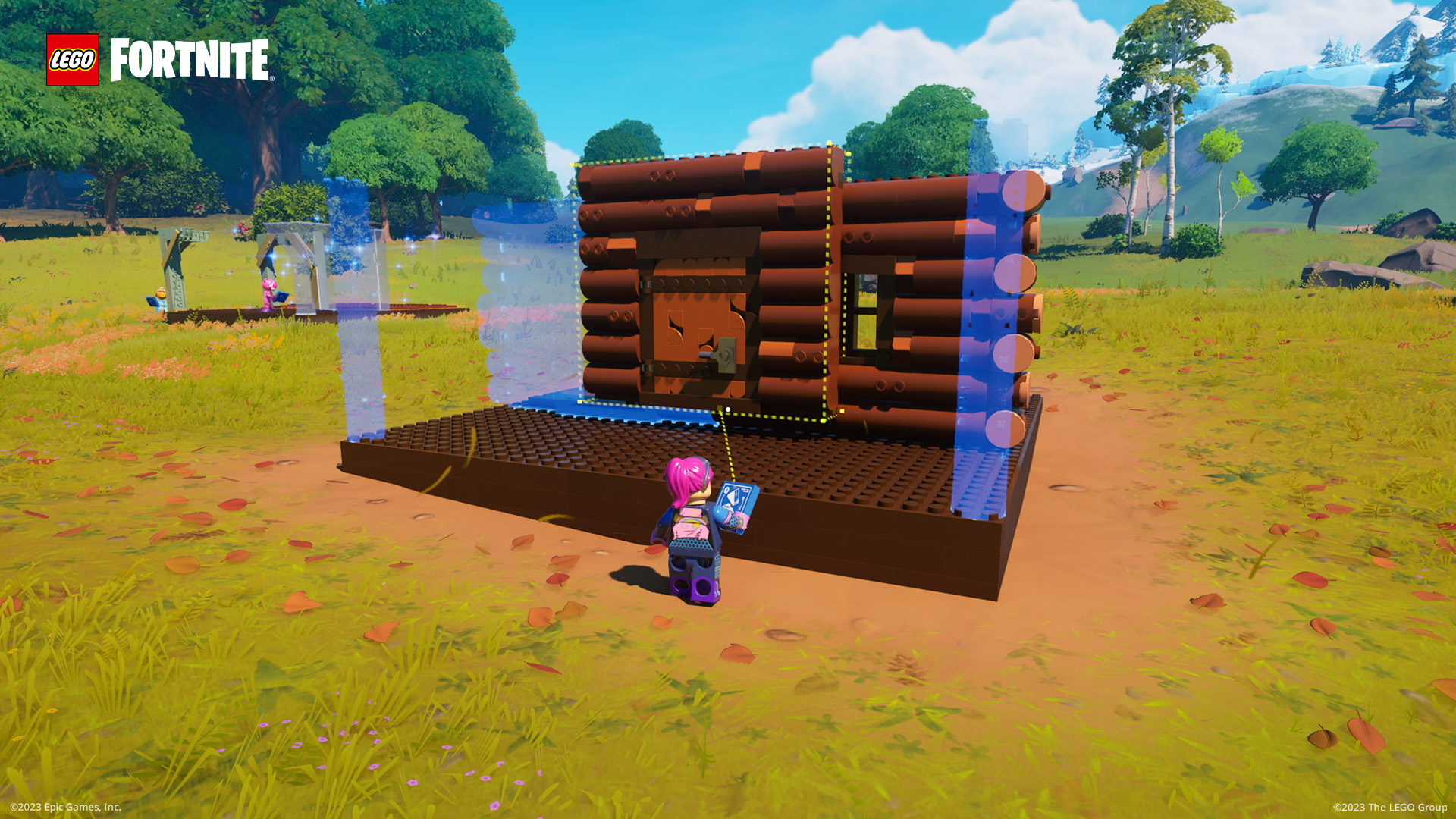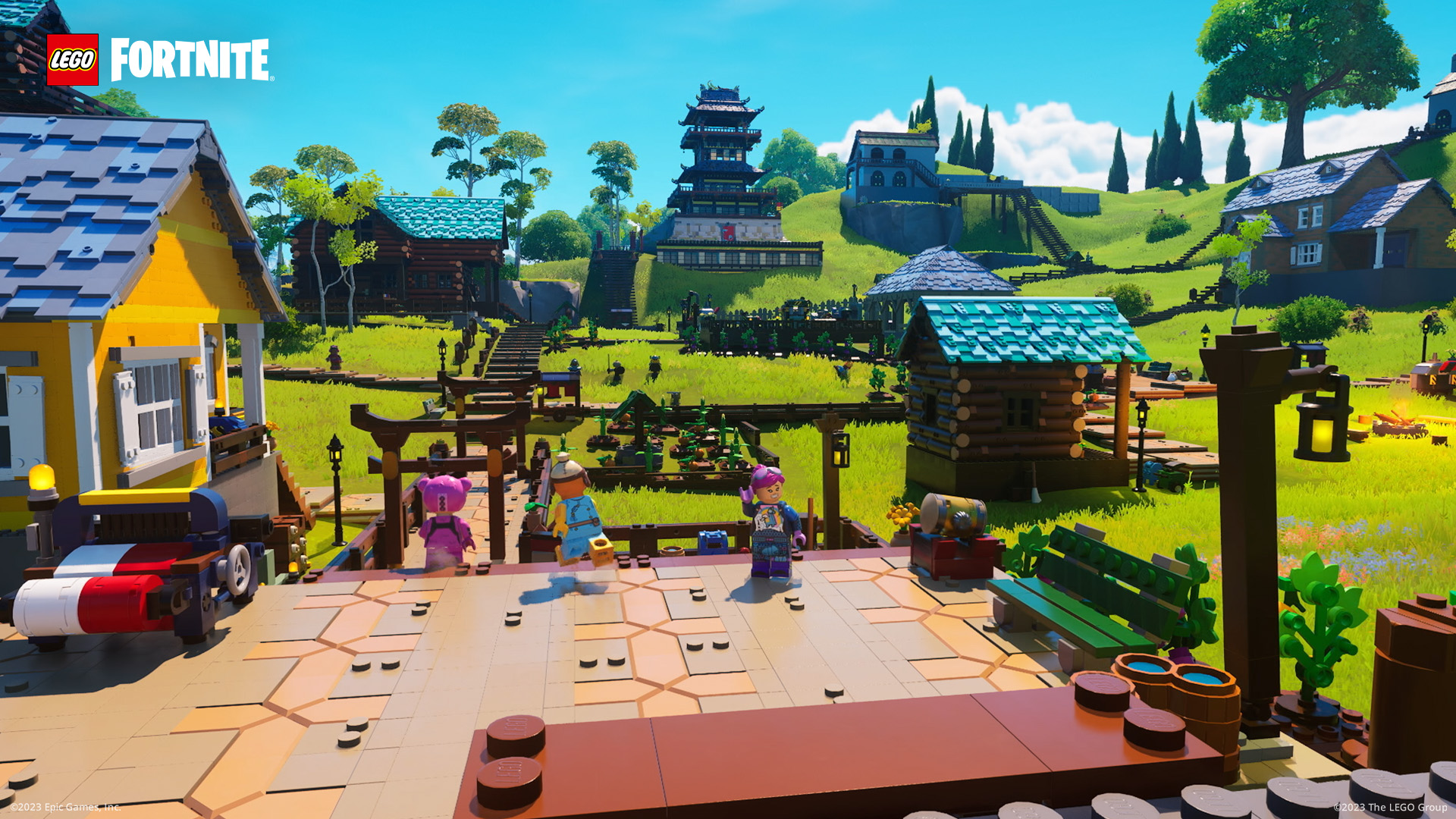
In April 2022, Epic Games announced a major long-term partnership with The Lego Group to create a kid-friendly metaverse.
At the time, we didn’t exactly know what that would entail; in fact, the initial announcement didn’t even name-drop Fortnite, Epic’s massively popular multiplayer game. Truthfully, I only expected some Lego skins or, at most, a crossover event. But after going hands-on with the experience, officially titled Lego Fortnite, I’ve come away extremely impressed.
Now, I should note that I wasn’t expecting Lego Fortnite to appeal to me. That’s because it’s a survival crafting sandbox experience in the vein of Minecraft, which generally isn’t my cup of tea. But it’s Epic’s approach to bringing the iconic toy brand to Fortnite — an approachable, standalone and free-to-play mode within the game itself — that really won me over. As the developer tells it, the ethos behind everything is that “Fortnite is the canvas, Lego bricks are the paint.”
This means that so many of the iconic battle royale game’s staples are turned into Lego, and vice-versa. On the Fortnite side, that works out to 1,200 skins getting turned into Lego minifigs — no small feat considering they all have unique looks and animations. Considering there are an estimated 1700-plus Fortnite skins, that also means that most will be getting the Lego treatment. So far, it’s also been confirmed that this includes some Marvel and Star Wars skins, like Spider-Man, Wolverine, Captain America, Darth Maul, Kylo Ren and Boba Fett.
As well, Lego Fortnite is also launching with 100 emotes which all carry over from the base game. There’s an undeniable charm in seeing someone like the intimidating hooded Raven doing the Headbanger or breakdancing in Lego form with minifig-appropriate animations. Epic says it plans to add more skins and emotes to Lego Fortnite over time, and any that you own from the base game will also be immediately useable in the Lego experience.
 If that was the extent of the partnership, I’m sure many fans would have been satisfied. But the actual crafting experience is remarkably robust, making it an entire game within Fortnite itself. That all starts with the 10,000 real Lego bricks that Epic has digitized in its Unreal Engine for Fortnite. What’s more, every single piece that’s in Fortnite is available in physical form, so you could, in theory, build everything yourself.
If that was the extent of the partnership, I’m sure many fans would have been satisfied. But the actual crafting experience is remarkably robust, making it an entire game within Fortnite itself. That all starts with the 10,000 real Lego bricks that Epic has digitized in its Unreal Engine for Fortnite. What’s more, every single piece that’s in Fortnite is available in physical form, so you could, in theory, build everything yourself.
With this toolkit, Epic provides players with two Minecraft-esque game types: a survival mode focused on resource management and a sandbox mode for unlimited resources. No matter which you go with, you’ll be placed in a procedurally generated world that’s a staggering 20 times larger than a Fortnite battle royale map. For the purposes of my demo, I was placed in a pre-made map that was gorgeously rendered, biome-diverse and recognizably Fortnite, just with a Lego aesthetic.
At first, I tried a bit of the survival mode. As mentioned, I don’t normally enjoy survival mechanics in games, but they’ve been streamlined here in such a way that it doesn’t feel cumbersome. To start, you have metres for negative statuses like hunger and cold, so you’ll need to use items like food/drink and clothing to offset them. You can also dodge and execute basic attacks with weapons like swords and crossbows to fend off enemies ranging from skeletons and spiders to pirates and wolves. Overall, it’s fairly standard stuff.
 Where Lego Fortnite really gets interesting is building. While I’ve normally never much cared for harvesting materials and other resources in games, there’s an undeniable charm in doing so here with Lego, whether it’s simply smashing brick objects like trees and rocks into wood and granite or petting a cow or chicken to receive milk or eggs. All of this helps go towards a village that you’ll slowly grow as you play.
Where Lego Fortnite really gets interesting is building. While I’ve normally never much cared for harvesting materials and other resources in games, there’s an undeniable charm in doing so here with Lego, whether it’s simply smashing brick objects like trees and rocks into wood and granite or petting a cow or chicken to receive milk or eggs. All of this helps go towards a village that you’ll slowly grow as you play.
Best of all, Lego Fortnite offers tight mechanics for the building itself, making it easy to use these resources. If you want to build specific things, like a campfire, crafting bench, spinning wheel or lumber mill, you can follow an intuitive Lego instruction manual-esque process. There was something oddly relaxing in taking my time going step-by-step to make a porch shack using familiar shaped Lego bricks and ensuring they were dragged, rotated and angled correctly. You can also recruit NPCs in the world to help you gather materials and expand your village with new constructs.
“All of this would be a compelling package in its own right, so the fact that it’s being offered for free within Fortnite is simply mind-blowing.”
But the real appeal for me was the free building, in which you can use generic bricks, specific parts of buildings like foundations, walls and stairs, food and drink items like pizza, burgers, pies and much more. To get a feel for this unimpeded by enemies or survival systems, I switched over to sandbox mode. Here, I had access to everything, and it was an absolute power trip. In fact, I’d go so far as to say it reminded me of The Legend of Zelda: Tears of the Kingdom in the best way possible. Using a flat rectangular base, I attached four wheels, a few large thrusters and an “on/off switch” to create a makeshift car and found myself zipping across the map. That was just a basic creation, of course, but I soon switched over to hot air balloons, gliders and grappling hooks for even more fun and wacky traversal.
 And while my limited demo time meant I didn’t have much time to get truly wild with my own creations, Epic did show us a tantalizing sizzle reel of some creations that members of the development team have made. Some of these highlights include an Up-esque balloon-equipped floating house, a giant castle inside of a lava-filled cave, a floating restaurant on the sea and roller coasters using just wheels and platforms. Given fans’ amazingly creative Tears of the Kingdom videos, I’m eager what the Fortnite community does with these new Lego mechanics.
And while my limited demo time meant I didn’t have much time to get truly wild with my own creations, Epic did show us a tantalizing sizzle reel of some creations that members of the development team have made. Some of these highlights include an Up-esque balloon-equipped floating house, a giant castle inside of a lava-filled cave, a floating restaurant on the sea and roller coasters using just wheels and platforms. Given fans’ amazingly creative Tears of the Kingdom videos, I’m eager what the Fortnite community does with these new Lego mechanics.
Indeed, there’s so much potential for Lego Fortnite. On a base level, the moment-to-moment resource gathering and town management should appeal to survival and sim genre fans, especially with the promise of vast, procedurally-generated worlds filled with nooks, crannies and loot-filled caves to explore. But even if you’re like me and aren’t so interested in that, there’s so much fun to be had in the sandbox mode, especially since friends can share in on the fun and — if you give permission — may even continue working on your creations when you’re offline.
 All of this would be a compelling package in its own right, so the fact that it’s being offered for free within Fortnite is simply mind-blowing. So far, Lego Fortnite is a massively impressive experience that adds significantly to the already rock-solid core battle royale suite, and I can’t wait to see where Epic takes it.
All of this would be a compelling package in its own right, so the fact that it’s being offered for free within Fortnite is simply mind-blowing. So far, Lego Fortnite is a massively impressive experience that adds significantly to the already rock-solid core battle royale suite, and I can’t wait to see where Epic takes it.
Lego Fortnite will launch in Fortnite on December 7th. It’s the first of three new standalone game modes coming to the game this week; on December 8th, Psyonix’s Rocket League-inspired Rocket Racing will debut, while Harmonix’s Rock Band-like Fortnite Festival will drop on December 9th.
Update 07/12/2023 12:20pm ET: Updated to include confirmation of Marvel and Star Wars Lego skins.
Image credit: Epic
MobileSyrup may earn a commission from purchases made via our links, which helps fund the journalism we provide free on our website. These links do not influence our editorial content. Support us here.


